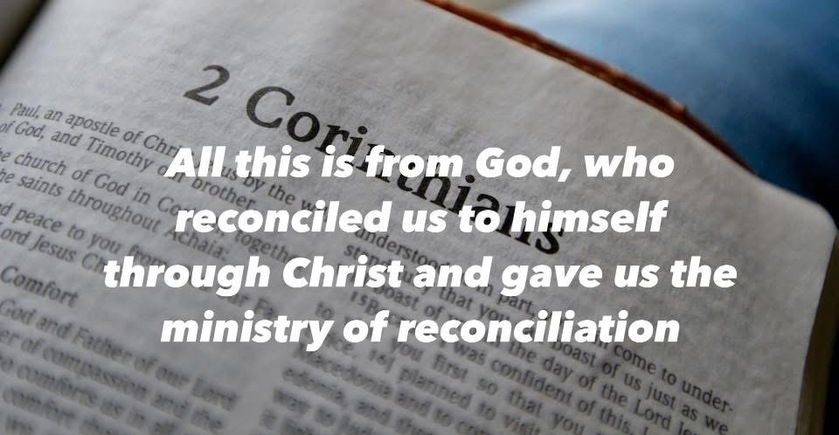Trump’s Heavenly Gamble: Saving Lives for Salvation or Spirit-Led Overflow?
Read Acts 19:1-7
"And it happened that while Apollos was at Corinth, Paul passed through the inland country and came to Ephesus. There he found some disciples. And he said to them, "Did you receive the Holy Spirit when you believed?" And they said, "No, we have not even heard that there is a Holy Spirit." And he said, "Into what then were you baptized?" They said, "Into John's baptism." And Paul said, “John baptized with the baptism of repentance, telling the people to believe in the one who was to come after him, that is, Jesus." On hearing this, they were baptized in the name of the Lord Jesus. And when Paul had laid his hands on them, the Holy Spirit came on them, and they began speaking in tongues and prophesying. There were about twelve men in all."
There are some who would say that the greatest capacity of human kind is as a vessel in which they can contain God. But I would say, humanity is less a vessel and more a conduit through which the Holy Spirit flows in and outwardly. This is to say that nothing can contain God, but humanity was created in such a way as to serve as a means to receive and share God's power. Unfortunately, many approach God's Spirit as if they contain Him. They live as an earthly vessel focused upon the renewal and recreation of themselves. They attempt to bottle up God's Spirit subjectively. But they shouldn't be satisfied with this kind of relationship. The Spirit should overflow from them and be shared with others, like a river of living water. This isn't just about you, you and your salvation, you and your entrance into heaven.
Recently, the President of the United States commented,
"If I can save 7,000 people a week from being killed, I think that’s pretty...I want to try to get to heaven, if possible, I’m hearing that I’m not doing well. I am really at the bottom of the totem pole...But if I can get to heaven, this will be one of the reasons."
(from an August 19, 2025, Fox News interview in the context of his efforts to broker peace in the Ukraine war)
How do we feel about this statement? How's Trump doing on his theology?
In the book of Acts, each instance of the Holy Spirit coming upon believers is an overflowing witness. It’s designed to overflow like living water (John 7:38-39), empowering believers to share God’s power outwardly in service, prophecy, and producing the transformation of others. The Ephesian disciples didn’t receive the Spirit just for personal edification; it immediately propelled them into speaking tongues and prophesying, impacting their community. It’s not merely about their individual salvation or heavenly entry but about being conduits for God’s kingdom purposes here and now.
President Trump frames his diplomatic push not just as a geopolitical strategy but as a moral and spiritual endeavor, tying it to his own hopes for heaven despite his self-perceived shortcomings. On one level, this reflects a positive impulse: a desire to do good on a massive scale, saving lives and pursuing peace, which aligns with biblical calls to be peacemakers (Matthew 5:9) and to value human life (Genesis 9:6; Psalm 82:3-4). It’s outward-focused in that sense, echoing this conduit idea, using one’s position to channel a positive change for others rather than hoarding influence for self.
That said, the statement also raises some theological red flags when viewed through a biblical lens. Trump’s phrasing, "if I can get to heaven, this will be one of the reasons" suggests a works-based understanding of salvation, where good deeds (even monumental ones like saving thousands of lives) contribute to earning divine favor or entry into heaven. This isn’t unique to this quote; he’s expressed similar sentiments before, like in a 2024 interview where he said, "If I’m good, I’m going to heaven," implying morality as the key metric in his idea of how one gets to heaven.
From a core Christian perspective, particularly in Protestant traditions emphasizing sola fide (faith alone), this misses the mark. Scripture teaches that salvation is a gift of grace through faith in Jesus Christ, not something we merit by our actions (Ephesians 2:8-9).
That said, the fruits we bear are a sign of our living faith. Good works are important in that sense, but they’re the fruit of genuine faith and the evidence of the Spirit’s indwelling, not the root cause of salvation (Ephesians 2:10; James 2:14-26). Entry to heaven is not merit based. Jesus Himself warned against relying on impressive deeds for heavenly approval, as in Matthew 7:21-23, where even those who prophesied and performed miracles in His name could be turned away if they lacked a true relationship with Him.
So how are we to take these statements from our President?
I see it as evidence of a superficial or moralistic view of faith, prioritizing "being good" over repentance, faith in Christ’s atonement, and the transformative work of the Holy Spirit. And he is not alone in this. And likely he has developed this attitude about spirituality by hanging around the likes of Paula White who teaches a moralistic merit based approach to faith in her "prosperity" gospel. It’s a common pitfall in broader cultural Christianity, where faith gets reduced to ethical behavior or personal achievements rather than a transformative relationship with Christ empowered by the Holy Spirit. From this perspective it's a transactional relationship between God and man.
But maybe we can find the Holy Spirit at work in him just the same?
I see the President's spiritual take as a mix of sincere aspiration and theological misunderstanding, much like the disciples in our focus scripture today in Acts 19 who were genuine in their repentance under John’s baptism but lacked the full gospel of Jesus and the Spirit’s indwelling. Trump’s words reveal a desire for moral legacy and eternal hope, which is commendable on a human level, his wanting to save lives and pursue peace is an outward expression that could align with being a conduit for good. This could be seen as an example of agape love (unconditional Godly love). And therefore, an expression of the indwelling Spirit, because that love comes only from God. It's an outpouring of the Holy Spirit. However, framing heaven as something earned through "being good" or via specific accomplishments veers into a works-righteousness mindset, where salvation becomes a merit-based transaction rather than a gift received by faith. So, the President still has some work to do on his theological vision, but he was humble enough to suggest that he does have work to do in that regard.
This perspective isn’t unique to Trump; it’s echoed in what some theologians call "moralistic therapeutic deism," a watered-down faith prevalent in American culture that views God as a distant benefactor who rewards good behavior and ensures personal well-being. Prosperity gospel teachings, which Paula White has been closely associated with, often amplify this by linking faith to material success, health, and influence as signs of divine favor. White, who has served as Trump’s personal pastor and spiritual advisor since at least 2017, and more recently heads the White House faith office in his administration, and she promotes a theology that critics argue twists Scripture to emphasize "sowing seeds" (often financial) for supernatural blessings, implying a quid-pro-quo with God.
Trump’s repeated comments suggest he’s absorbed elements of this optimistic, achievement-oriented spirituality. Biblically, this approach risks inverting the gospel: instead of the Spirit flowing through us as conduits to produce fruit (like peacemaking or compassion) as evidence of salvation, it treats those fruits as the means for securing it.
James 2:14-26 reminds us that faith without works is dead, but works that flow from faith, not vice versa. Jesus’ warning in Matthew 7:21-23 is particularly poignant here, impressive acts, even in His name, don’t guarantee entry if the heart isn’t aligned with knowing Him. In Acts 19, Paul doesn’t dismiss the disciples’ prior baptism; he builds on it, leading them to fuller truth. Similarly, we can view Trump’s statements charitably as an incomplete understanding, perhaps shaped by prosperity influencers that prioritize visible success over inner repentance and Spirit-led transformation. We should be praying for him and others like him. And we should understand the contextual vision. Ultimately, this highlights a broader cultural challenge: many, including public figures, approach faith superficially, bottling it up for personal gain or moral self-assurance rather than letting it overflow as living water for others. To some degree I can see an overflowing in the President's comments. So it’s a call for a gracious dialogue, much like Paul’s in Ephesus, pointing people beyond moralism to the full gospel of Christ.
Living faith naturally produces good works, like a tree bearing fruit. In Trump’s case, critiquing his statements theologically is valid, but shifting focus to observable byproducts, actions that demonstrate peacemaking, compassion, or justice, allows for a more holistic, charitable assessment, much like Paul’s approach in Acts 19. There, he affirmed the disciples’ starting point before guiding them further, and similarly, we can pray for deeper transformation while recognizing any positive overflow.
Biblically speaking, fruits aren’t just grand gestures but the Spirit’s qualities flowing through us: love, joy, peace, patience, kindness, goodness, faithfulness, gentleness, and self-control. Applied to a public figure like President Trump, this means looking beyond his rhetoric to impacts on people and society. From a non-partisan lens, his record shows a mix, some actions that could be interpreted as fruitful conduits for good, others that draw criticism for lacking compassion or aligning with the full gospel ethic. Only God can judge him fully, and based upon his remarks, I believe the President understands that much.
Focusing on fruits encourages grace over judgment, seeing potential overflow even amid incompleteness. If Trump’s peacemaking saves lives or his policies protect the vulnerable, that’s a Spirit conduit in action, pointing to God’s common grace at work. Yet, as Jesus taught, true fruit endures and stems from abiding in Him (John 15:4-5), not self-effort. If I could share one truth with the President, it would be that. Don't stop doing what you're doing, but don't believe that your effort is earning your way into glory. Put your trust in Jesus Christ Mr. President, in Him alone.
As for us? This broader challenge calls us to model the full gospel ourselves: praying for leaders (1 Timothy 2:1-2), engaging in dialogue, and letting the Spirit flow through our own lives.
Prayer:
Heavenly Father, as conduits of Your boundless Spirit, help us release the living water You’ve poured into us, not hoarding it for our own assurance but sharing it to heal and transform the world. Guide leaders and seekers alike beyond moral striving to true faith in Christ, bearing fruits that glorify You. In Jesus’ Holy name, Amen.




















